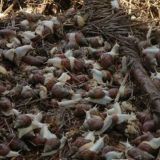蜗牛的疾病预防和治疗如何?

Answer:
Prevention and Treatment of Snail Fever in Snails
1. Avoid Contact with Snail Infested Areas:
- Avoid visiting areas with snail populations or their waste.
- Wear gloves and long sleeves when handling snails or their habitats.
2. Quarantine New Snails Thoroughly:
- Quarantine new snails for at least 48 hours before introducing them to your collection.
- Inspect them for any signs of infection, such as redness, swelling, or mucus.
3. Treat Infected Snails Immediately:
- Treat infected snails with a veterinarian-approved medication, such as antibiotics or anti-parasitic drugs.
- Monitor the snails for signs of recovery and prevent complications.
4. Prevent Secondary Spread:
- Clean and disinfect surfaces and equipment used in handling snails.
- Avoid transferring snails or their waste to other environments.
5. Monitor the Health of Snails:
- Regularly inspect your snails for signs of illness or injury.
- Promptly treat any new infections or health problems.
6. Use Sanitizers and Disinfectants:
- Use sanitizers and disinfectants to clean and disinfect surfaces, equipment, and hands.
- Avoid using harsh chemicals or soaps that can irritate the snails.
7. Avoid Overcrowding:
- Keep snail populations small and controlled to reduce the risk of overcrowding.
- Provide ample space for each snail to move around and avoid competition for food and shelter.
8. Provide a Healthy Environment:
- Ensure that the environment provides a suitable habitat for snails, including adequate food, water, and shelter.
- Avoid overcrowding or excessive humidity, which can favor the spread of diseases.
9. Consult a Veterinarian:
- If you suspect a snail may be infected, consult a veterinarian for proper diagnosis and treatment.
- Early intervention can help prevent serious health problems.





































































